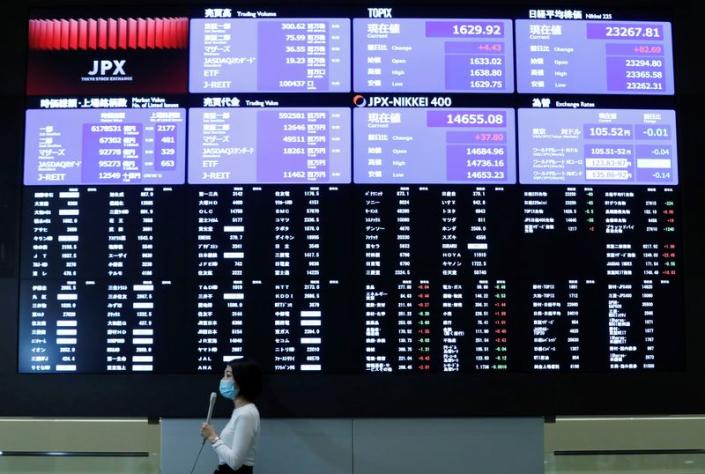Asian stocks were largely on the front foot on Friday with investor mood still upbeat after the US Federal Reserve this week signalled it was ready to give up on its interest rates campaign.
Shares across the region jumped to a four-month peak as sharp declines in the dollar and US yields extended a Fed-fuelled rally, but a pushback on rate cuts from central banks in Europe could see that optimism fade.
Japan’s Nikkei share average gained, supported by a pause in the yen’s ascent, which had previously weighed on exporters’ profit forecasts.
Also on AF: US, China Out to Stop Quantum Computers Stealing World’s Secrets
The Nikkei ended the day up 0.87% at 32,970.55, marking a weekly gain of 2.05%, and decisively ending a two-week losing run. The broader Topix added 0.47%, notching a 0.34% weekly advance.
Japan’s currency traded at around 142 per dollar on Friday, retreating from the four-and-a-half-month peak of 140.95 reached overnight.
Automaker shares benefited, with Toyota up 1.13%, Nissan gaining 2.94% and Subaru jumping 4.51%.
The yen has strengthened about 5% in three weeks, driven by bets that the Bank of Japan is nearing an exit from negative interest rates, while expectations for the Federal Reserve point to a potential rate cut. The BOJ’s next policy decision is scheduled for Tuesday.
Mainland China stocks gave up early gains. Data from the world’s second-largest economy showed factory and retail sectors sped up in November but some indicators missed expectations, suggesting the recovery is not solid yet.
China’s central bank boosted liquidity injections but kept the interest rate unchanged when rolling over maturing medium-term policy loans.
The blue-chip CSI 300 Index fell 0.31% and the Shanghai Composite Index lost 0.56%, or 16.43 points, to end at 2,942.56. The Shenzhen Composite Index on China’s second exchange dropped 0.38%, or 7.07 points, to 1,828.20.
Beijing and Shanghai relaxed home purchase restrictions on Thursday, including by lowering the minimum deposit ratio for first and second homes, suggesting renewed efforts by Chinese authorities to revive the sluggish housing market.
Tech giants listed in Hong Kong surged 3.5%, and mainland developers soared 4.7%. The Hang Seng Index rallied 2.38%, or 390.00 points, to 16,792.19.
Elsewhere across the region, in earlier trade, Sydney, Seoul, Mumbai, Taipei and Manila were also in the green. MSCI’s broadest index of Asia-Pacific shares outside Japan was last up 0.9%.
Dow Jones at All-Time High
Europe was also set to open higher, with Eurostoxx 50 futures up 0.2% and FTSE futures gaining 0.3%. Both S&P 500 futures and Nasdaq futures edged 0.1% higher.
On Wall Street, the Dow Jones climbed to a fresh all-time high and the S&P 500 and Nasdaq made new 2023 peaks, as markets wagered on a total of 150 basis points in monetary easing – the equivalent of six cuts – for the Fed next year.
But overnight, a host of Europe’s central banks stuck to plans to keep policy tight well into next year, dashing any hope that the Fed’s pivot towards rate cuts marked a global turning point.
The euro jumped 1.1% overnight and the sterling surged 1.2% before holding mostly steady in Asia on Friday. That helped pressure an already frail US dollar, which is down 1.9% for the week and hovered near a four-month low at 101.97 against its major peers.
British bond yields retraced steep falls on Thursday and Germany’s 10-year bond yield bounced off session lows. Treasuries are, however, still heading for the best week in over a year, with the benchmark 10-year yields down a whopping 30 basis points to below 4% for the first time since July.
Data also showed US retail sales unexpectedly rebounded in November and jobless claims dipped, suggesting the economy is still too strong to justify the kind of rate cuts baked in next year, but markets were too jubilant to see that.
Treasuries steadied at the end of a stellar week, with the 10-year yields up 2 basis points to 3.9465%. On a weekly basis, they are down 29.8 basis points. Two-year yields also rose 2 bps to 4.4217%, but were down 31 bps for the week.
Oil prices extended their rally in opposition to the soft dollar after the International Energy Agency (IEA) lifted its oil demand forecast for next year.
US crude rose 0.2% to $71.75 per barrel, after surging more than 3%, while Brent was also up 0.3% to $76.80 per barrel.
Key figures
Tokyo – Nikkei 225 > UP 0.87% at 32,970.55 (close)
Hong Kong – Hang Seng Index > UP 2.38% at 16,792.19 (close)
Shanghai – Composite < DOWN 0.56% at 2,942.56 (close)
London – FTSE 100 > UP 0.03% at 7,651.32 (0935 GMT)
New York – Dow > UP 0.43% at 37,248.35 (Thursday close)
- Reuters with additional editing by Sean O’Meara
Read more:
Evergrande Sells Key Shanghai Stake as China Property Weakens
China Central Bank Set to Boost Liquidity, Poll Forecasts
Foreign Investors Turn to Asia Bonds as US Yields Dip
Hang Seng Lifted by Fed U-Turn Signal, Yen Surge Hurts Nikkei























